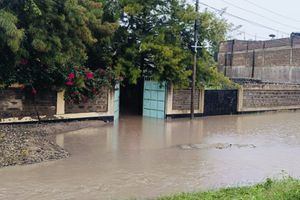Painful experience that gave birth to Nakuru Hospice

FRANCIS MUREITHI | Nation
Inset: The old hospice at Rift Valley Provincial General Hospital that was unable to cope with the cancer patients in Nakuru. Top: Ms Elizabeth Wambui Ndung’u at the new Nakuru Hospice under construction.
What you need to know:
- One woman’s crusade has led to the opening of the first facility to take care of terminally ill cancer patients in Nakuru Town
One woman’s crusade for a fully-fledged wing for cancer patients at Rift Valley Provincial General Hospital, Nakuru, is about to bear fruit after several years of lobbying.
From this month, cancer patients who had been lumped together with other patients in the hospital’s general wards will have a place of their own.
The hospital has been taking care of more than 500 cancer patients, all who will now be moved to the modern Nakuru Hospice.
This is all thanks to Ms Elizabeth Wambui Ndung’u, who succeeded in persuading the hospital’s management to allow her trust fund to turn an old abandoned casualty wing into the new hospital for cancer patients.
Ms Wambui, 48, says the hospice will serve thousands of terminally ill cancer patients from Nakuru, Baringo and Narok counties, who in the past had been travelling to Eldoret or Nairobi for services.
“Cancer patients undergo one of the most traumatising and painful moments in their lives and some die prematurely due to lack of care. This is something that breaks my heart every time I visit a cancer patient at home or at the hospital,” says Ms Wambui.
She adds: “The only gift that terminally ill patients require is proper care, and this is what has been driving me all along.”
Starting the project, however, did not cross her mind until she saw her father, Arthur Ndung’u, die painfully in 2005 after a long struggle with prostrate cancer.
“I saw my father succumb in a lot of pain, I would not like to see another cancer patient die in such pain. With a little care, they should die peacefully and in less pain,” she says.
She says managing a cancer patient is not an easy task as many patients are full of anger and tend to feel neglected.
The drugs administered to cancer patients are expensive; not many patients can afford to pay Sh20,000 for drugs that last only a month.
“Financial constraints caused by cancer patients to families are enormous. Chemotherapy and radiotherapy are very expensive and cost Sh30,000 per dose,” says Ms Wambui.
Cancer patients, she says, have brought about family conflicts in homes because of their demands.
But how did she initiate the project?
“I first approached a friend who told me to take my ailing father to the hospice for care, and when I came to Nakuru to inquire, the word hospice sounded Greek to many,” recalls the mother of two grown up girls.
She went to Nairobi Hospice to make more inquiries, and that is where she learnt more about palliative care — the caring of terminally ill cancer patients.
Armed with this information and the good relationship she created with the then chief executive officer of Nairobi Hospital, Dr Brigid Sirengo, she organised a training session for palliative care for health professionals and other paramedics in Nakuru in February, 2006.
“The week-long training inspired all the participants and at the end of the training everybody felt that we must have a hospice in Nakuru,” recalls Ms Wambui, an accountant and holder of a Masters degree.
After the training, she approached the management of the Rift Valley Provincial General Hospital and was advised to apply for space at the hospital.
Her proposal was finally approved in July 2007 and the following year the government endorsed the project and that saw the birth of the Nakuru Hospice Trust Fund.
Ms Wambui thanks Hospice Care Kenya, a charitable organisation in United Kingdom, through its chairperson, Ms Elizabeth Samond, who donated Sh500,000 to start up the hospice.
“We started by buying cancer kit, drugs, and visiting patients as most of them are rarely brought to the hospitals, or when they are, they are usually on their last moments,” she adds.
Safaricom Foundation gave the project Sh4.8 million while Hospice Care Kenya and Lions Club of Nakuru donated Sh500,000 each, which was used to purchase medical equipment and furniture.
The hospital will require a van to visit home-based patients and the trust is still waiting for a pledge by Constituency Development Fund which has yet to be fulfilled. The projects still requires funding before it becomes fully operational.
Ms Wambui is optimistic that the hospice will give hope to patients in the region who are terminally ill.




